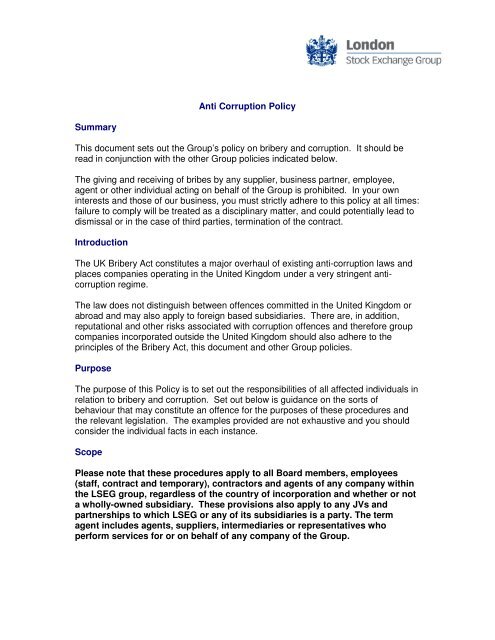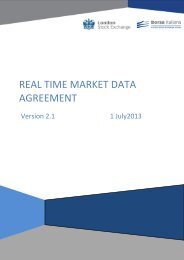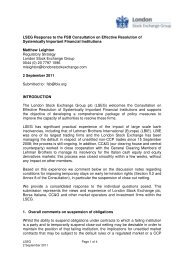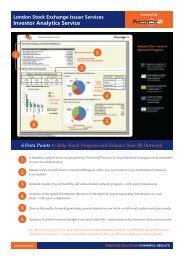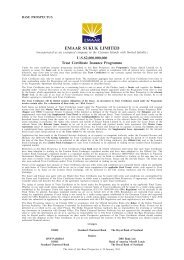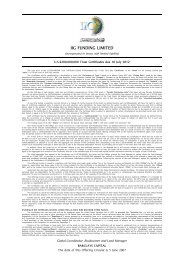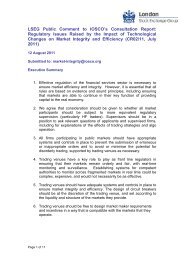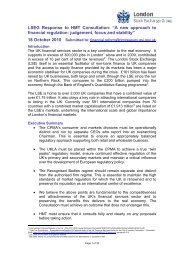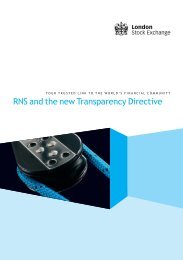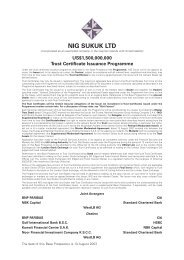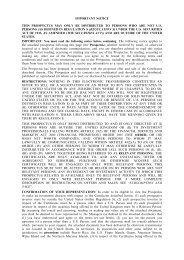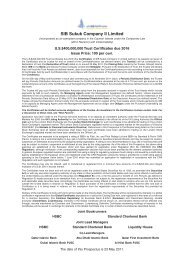LSEG Anti Corruption Policy - London Stock Exchange
LSEG Anti Corruption Policy - London Stock Exchange
LSEG Anti Corruption Policy - London Stock Exchange
Create successful ePaper yourself
Turn your PDF publications into a flip-book with our unique Google optimized e-Paper software.
Summary<br />
<strong>Anti</strong> <strong>Corruption</strong> <strong>Policy</strong><br />
This document sets out the Group’s policy on bribery and corruption. It should be<br />
read in conjunction with the other Group policies indicated below.<br />
The giving and receiving of bribes by any supplier, business partner, employee,<br />
agent or other individual acting on behalf of the Group is prohibited. In your own<br />
interests and those of our business, you must strictly adhere to this policy at all times:<br />
failure to comply will be treated as a disciplinary matter, and could potentially lead to<br />
dismissal or in the case of third parties, termination of the contract.<br />
Introduction<br />
The UK Bribery Act constitutes a major overhaul of existing anti-corruption laws and<br />
places companies operating in the United Kingdom under a very stringent anticorruption<br />
regime.<br />
The law does not distinguish between offences committed in the United Kingdom or<br />
abroad and may also apply to foreign based subsidiaries. There are, in addition,<br />
reputational and other risks associated with corruption offences and therefore group<br />
companies incorporated outside the United Kingdom should also adhere to the<br />
principles of the Bribery Act, this document and other Group policies.<br />
Purpose<br />
The purpose of this <strong>Policy</strong> is to set out the responsibilities of all affected individuals in<br />
relation to bribery and corruption. Set out below is guidance on the sorts of<br />
behaviour that may constitute an offence for the purposes of these procedures and<br />
the relevant legislation. The examples provided are not exhaustive and you should<br />
consider the individual facts in each instance.<br />
Scope<br />
Please note that these procedures apply to all Board members, employees<br />
(staff, contract and temporary), contractors and agents of any company within<br />
the <strong>LSEG</strong> group, regardless of the country of incorporation and whether or not<br />
a wholly-owned subsidiary. These provisions also apply to any JVs and<br />
partnerships to which <strong>LSEG</strong> or any of its subsidiaries is a party. The term<br />
agent includes agents, suppliers, intermediaries or representatives who<br />
perform services for or on behalf of any company of the Group.
<strong>Policy</strong><br />
The giving and receiving of bribes or attempts to induce particular behaviour through<br />
offering payments or advantages outside ordinarily acceptable amounts or in excess<br />
of payments/services required by law or regulation will not be tolerated. Such<br />
behaviour may constitute a disciplinary offence and could result in dismissal.<br />
Political donations<br />
It is the policy of <strong>LSEG</strong> not to make any political donations as an organisation. No<br />
payments of company money should be made to any political party or individual<br />
politician in the UK or any other country. Employees may choose to make payments<br />
from their own money, but not with a view to influence a third party for the benefit of<br />
<strong>LSEG</strong>, or such as may be seen in that way.<br />
In-kind donations shall only be allowed with the prior written approval of the<br />
Corporate Responsibility Committee.<br />
Please refer to the Gifts and Hospitality policy for more details.<br />
Charitable donations<br />
<strong>LSEG</strong> permits reasonable donations to charities from <strong>LSEG</strong> funds through the <strong>LSEG</strong><br />
Foundation ("the Foundation") or corporate funds. No charitable donation from<br />
corporate funds in excess of £2,000 should be made without first referring to the<br />
Foundation Committee (for a full list of members, see the Foundation Terms of<br />
Reference). All donations from corporate funds have to be approved by the<br />
Foundation Committee Secretary and reported to the Foundation Committee on a<br />
quarterly basis. Participation at gala dinners and donations in–lieu are to be<br />
considered as charitable donations and managed in accordance with the above<br />
provision and the Gift and Hospitality policy.<br />
Internships<br />
The provision of an internship or work experience, whether paid or unpaid, to a third<br />
party (e.g. the parent of an intern who happens to be the CEO of an <strong>LSEG</strong> business<br />
partner) may be viewed as a benefit (and potentially an improper one). No offer<br />
should be made of any internship or work experience, without first seeking approval<br />
from your line manager and your HR contact. Any requests you receive for<br />
internships or work experience should be passed to your line manager and your HR<br />
contact for consideration.
Offences and Bribery<br />
The Bribery Act contains four offences:<br />
1. A general offence of offering, promising or giving a bribe (active bribing).<br />
2. A general offence of requesting, agreeing to receive or accepting a bribe<br />
(being bribed).<br />
3. A distinct offence of bribing a foreign public official to obtain or retain<br />
business. Unlike with the private sector offences, there is no need for the<br />
official to act improperly as a result of the bribe, it is sufficient if the individual<br />
offers the bribe intending to influence him in his capacity as a public official.<br />
4. A strict liability offence for commercial organisations where they fail to<br />
prevent bribery by those acting on their behalf.<br />
Any action constituting one or more offences is strictly prohibited.<br />
Please note that:<br />
1. These offences apply to individuals in the public or in the private sector.<br />
2. Local law is no defence – the Act applies to acts committed in the UK and<br />
overseas (where the act or offence would have been an offence if done in<br />
the UK even where local custom may appear at odds with this).<br />
3. A bribe can consist of giving a financial advantage or any other type of<br />
advantage in return for securing particular behaviour.<br />
4. “Facilitation payments” ie payments which are made to secure a right which<br />
you already have, e.g. release of goods from customs, are prohibited.<br />
5. In order to prevent allegations of bribery arising from gifts or hospitality<br />
offered during the course of business, strict limits have been put in place as<br />
to ordinarily acceptable values for gifts and hospitality.<br />
Other relevant policies<br />
The following Group policies must be read in conjunction with this policy:<br />
• Gifts & Hospitality policy<br />
• Confidentiality policy<br />
• Whistle blowing policy<br />
• Delegated levels of authority<br />
• Related party transactions<br />
• Recruitment policy<br />
• Group Business Principle<br />
• The Finance Manual (Purchasing and Payment and Authorisation Matrix<br />
sections)<br />
• Competition Compliance policy<br />
• Appointment of Agents policy<br />
• Group Purchasing <strong>Policy</strong><br />
• Specific policies applicable to UK Regulation Department such as the<br />
Hospitality <strong>Policy</strong> and the UK Regulation Handbook
In your own interests and in those of our business, you must strictly adhere to<br />
these guidelines, including all the policies referred to, at all times.<br />
Failure to comply may constitute an act of misconduct resulting in disciplinary<br />
action, including dismissal. Violation of anti-bribery laws could also trigger<br />
criminal sanctions for the individuals concerned.<br />
Jurisdictions other than the United Kingdom might also have specific anti-bribery<br />
provisions (e.g. Italy “231”) which must also be complied with, therefore to ensure<br />
compliance please contact the Legal Department before proceeding.<br />
In any case, where you have any concerns or are unsure about a particular<br />
course of action, it is essential that you contact the Legal Department before<br />
proceeding.
Specific Offences<br />
1) Being offered an advantage, directly or through a third party, to act in an<br />
improper manner (Being bribed)<br />
This is the so called “passive bribery” offence, e.g. a situation whereby you are<br />
offered an inducement (eg money, entertainment or an advantage for yourself or<br />
someone else) to act in a way which would be outside the scope of your<br />
responsibilities/an improper performance of your responsibilities.<br />
Examples of behaviour that is prohibited<br />
• An employee involved in activities such as listing of financial instruments<br />
(e.g. Borsa Italiana listing functions, LSE AIM department) is asked to omit or<br />
reduce the level of control over certain requirements in the market rules in<br />
return for a benefit;<br />
• An employee in charge of purchases is offered an inducement to add a<br />
certain provider to the list of authorised providers/choose a particular<br />
contractor;<br />
• An employee in the info-services department offers a substantial discount, or<br />
particularly favourable conditions to a client in exchange for a kickback;<br />
• An employee carrying out market data audits is offered an inducement to<br />
falsify/amend audit findings in favour of the customer;<br />
• An employee with responsibility for procurement accepting a kickback from a<br />
potential supplier.<br />
What to do if someone tries to bribe you<br />
1. If the offer could in any way be seen as an inducement either to do<br />
something or not do something in your capacity as an employee of our<br />
Group, the offer must be immediately rejected or, if it is a gift which has<br />
already been delivered, return to the sender. Whilst it will generally be the<br />
case that anything permitted by the Gifts and Hospitality policy will be<br />
acceptable, this will not be a defence if it is intended to, or does in fact,<br />
induce you to act in a way which is outside the scope of your responsibilities<br />
or is an improper performance of your responsibilities. Your behaviour could<br />
still be an offence under the Bribery Act and the relevant penalties applied.<br />
Where there is doubt, it is imperative that you contact the Legal<br />
Department immediately for clarification.<br />
2. Immediately inform your line manager and Contact the Legal Department<br />
without delay;<br />
3. Log the instance in accordance with the requirements of the Gift & Hospitality<br />
policy;<br />
4. UK Regulation employees should also consider the relevant policy<br />
(Hospitality <strong>Policy</strong> for UK Regulation).<br />
Other relevant policies<br />
- Gift & Hospitality policy<br />
- Finance Manual (Purchasing)
- Group Purchasing policy<br />
- Whistle Blowing policy<br />
- Group Business Principles<br />
- Specific policies applicable to UK Regulation<br />
- Competition Compliance policy (for pricing issues)<br />
2) What to do if you think you have been asked to give an advantage to<br />
someone in order to induce them to behave improperly/in the company’s<br />
favour (Active bribing)<br />
This is the so called “active bribery” offence, ie a situation whereby you give or<br />
promise to give something (eg cash, a favour, hospitality or other benefit) to a third<br />
party to induce him/her to behave improperly. Bear in mind that any benefit or<br />
advantage, whether direct or indirect, may potentially be caught if it is given to induce<br />
an improper performance. In addition to more obvious examples such as cash<br />
payments, gifts or excessive hospitality, indirect advantages may include the<br />
provision of work experience or an internship (whether paid or unpaid) or donations<br />
to a political party or a charity.<br />
Examples of behaviour that is prohibited<br />
• Employees marketing trading platforms or other services offer an inducement<br />
in order to win a bid;<br />
• An Agent acting for the Company offers an inducement in order to win a bid;<br />
• An employee offers a benefit to a regulator in return for the approval of anticompetitive<br />
market rules by that regulator (this behaviour if carried out<br />
outside the UK could fall into the foreign public officials offence under point 4<br />
below as well).<br />
What to do<br />
1. Do not offer, promise or give, either directly or through a third party, any<br />
advantage in order to have someone act improperly;<br />
2. If someone asks you to do this, immediately inform your line manager and<br />
contact the Legal Department without delay<br />
3. Should you have any reason to believe that anyone within our Group is<br />
involved in a situation which could amount to “active bribing” under the<br />
Bribery Act please contact the Legal Department immediately.<br />
Other relevant policies:<br />
- Gift & Hospitality policy<br />
- Finance Manual (Authorisation Matrix; Payments)<br />
- Delegated levels of authority<br />
- Group Business Principles<br />
- Specific policies applicable to UK Regulation<br />
- Whistle blowing policy<br />
- Appointment of Agents policy
3) What to do in the event of being asked to give an advantage to someone to<br />
facilitate a transaction (so called: “facilitation payment”)<br />
This offence differs from the ones above because the payment is made to facilitate<br />
the completion of an activity which is not improper in itself.<br />
Examples of behaviour that is prohibited<br />
- Paying sums to a government official to personally keep or which are beyond<br />
any standard administration fee in order to speed up the release of goods<br />
from customs;<br />
- Paying sums to a government official to personally keep or which are beyond<br />
any standard administration fee in order to obtain a travel or working VISA;<br />
- Paying to speed up the approval of amendments to market rules or by-laws;<br />
- Paying to obtain planning authorisations.<br />
The above behaviour if involving foreign public officials could also fall within the<br />
scope of the offence described at 4) below.<br />
What to do if someone tries to obtain a payment from you to speed certain<br />
procedures<br />
1. Do not offer, promise or give, directly or through a third party, any advantage<br />
in order to speed or facilitate the performance of relevant function;<br />
2. Immediately inform your line manager;<br />
3. Contact your local legal team without delay;<br />
4. Should you have any reason to believe that anyone within our Group is<br />
involved in a situation which could amount to giving a “facilitation payment”<br />
you must contact your local legal team immediately.<br />
Other relevant policies<br />
- Gift & Hospitality policy<br />
- Finance Manual (Authorisation Matrix)<br />
- Delegated levels of authority<br />
- Group Business Principles<br />
- Whistle blowing policy<br />
4) Bribing Foreign Public Officials (for the purpose of this policy Foreign<br />
means non British public official) with the intention to retain or obtain business<br />
or an advantage in the conduct of business<br />
This is triggered when a Foreign Public Official receives or is offered an inducement<br />
in order to obtain or retain a business advantage. It does not require the public<br />
official to act improperly.<br />
Examples of behaviour that is prohibited<br />
- The examples given in 2) and 3) above would constitute this offence where<br />
the advantage is offered or given to a Foreign Public Official.
- If legitimate hospitality or travel costs are required to be given for a business<br />
purpose, for example where <strong>LSEG</strong> wishes to demonstrate its business<br />
capability by inviting officials to visit its premises, then the trip should be kept<br />
to a reasonable cost and length, should not include leisure activities and<br />
should probably be offered to the relevant department head, with a request<br />
that he nominate attendees from his department, rather than being offered<br />
directly to individuals.<br />
What to do if a Foreign Public Official, directly or indirectly, tries to obtain a<br />
bribe from you<br />
1. Unless local written laws permit or require the official to be influenced by the<br />
payment (an extremely unlikely situation which can only be confirmed by<br />
checking with Legal) you must not bribe a Foreign Public Official or another<br />
person at the request of the Foreign Public Official or with his/her assent or<br />
acquiescence;<br />
2. Refrain from offering, promising or giving, directly or through a third party,<br />
anything to a family member of a Foreign Public Official with the intention to<br />
retain or obtain business or an advantage in the conduct of business;<br />
3. Note that political donations, charitable donations or engagement of a<br />
company linked to a Foreign Public Official may all be ways of making an<br />
improper payment, indirectly, to the Foreign Public Official.<br />
4. Always discuss the situation with your line manager and keep him / her<br />
informed of any developments in the relationship with Foreign Public<br />
Officials;<br />
5. Contact the Legal Department without delay;<br />
6. Should you have any reason to believe that anyone within our Group is<br />
involved in a situation which could amount to “bribing a Foreign Public<br />
Official” under the Bribery Act please contact the Legal Department<br />
immediately.<br />
Other relevant policies:<br />
- Gift & Hospitality policy<br />
- Finance Manual (Authorisation Matrix; Payments)<br />
- Delegated level of authority<br />
- Whistle blowing policy


